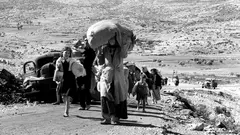Pan-Arabism | Arab Nationalism
All topics-
 Middle East conflict
Middle East conflictTwo peoples' experience of displacement
The Israel-Palestine conflict is multilayered and very complex. The greatest problem is that both sides have reason to believe the other wants to destroy them
-
 Egypt's Muslim Brothers
Egypt's Muslim Brothers"Who determines the future of the Brotherhood remains unclear"
Since the military coup in Egypt ten years ago, Abdul Fattah al-Sisi's government has cracked down on the country's Muslim Brotherhood. Abdelrahman Ayash talks about the impact of this crisis, and how the organisation has evolved since 2013
-
 Cartoonists in the Arab world
Cartoonists in the Arab worldChildren of the revolution
How are comic book artists in the Arab world responding to the political situation in the region? Lena Bopp talks to illustrators Lina Ghaibeh and George Khoudry about young artists' collectives and feminist superheroes
-
 Iraq bans contact with Israel
Iraq bans contact with IsraelAnti-Semitism as state doctrine?
A law has been passed by the Iraqi parliament that criminalises any contact with Israel. In the midst of heated debates on the subject, one crucial aspect has been forgotten: the restitution of Jewish property. Birgit Svensson reports from Baghdad
-
 Khaled Khalifa’s “No One Prayed Over Their Graves”
Khaled Khalifa’s “No One Prayed Over Their Graves”The maelstrom of Aleppo
Longlisted for the 2020 International Prize for Arabic Fiction and now available in German translation, Khaled Khalifa’s novel “No One Prayed Over Their Graves” details lives and loves lost against the backdrop of a city undergoing seismic change. Joseph Croitoru read the book
-
 Culture and innovation in the Arab world
Culture and innovation in the Arab worldWhere are the new Arab icons?
As the photo of Fairouz talking to French President Emmanuel Macron spread around the world, many asked if Arabs today had any contemporary stars of Fairouz's standing. In this essay for Qantara.de, Khaled Al-Khamissi answers this question and asks whether there is a place for up-and-coming stars in a world that is so hostile to creativity and originality
-
 Humanism as a universal and humane concept
Humanism as a universal and humane conceptFrom Syria to Germany – the unifying struggle for democracy
Repression and despotism takes many forms. Yet as varied as these phenomena are, they all share a common core, argues Tarek Azizeh. Revolutions accompanying the struggle for democracy – wherever they occur – are all different manifestations of one and the same fight
-
 Interview with Algerian opposition leader Soufiane Djilali
Interview with Algerian opposition leader Soufiane DjilaliPolitical crisis in Algeria – is compromise in sight?
Presidential elections or constitutional assembly? Algeria's opposition continues to argue over ways to overcome the crisis. A proposal by the Jil Jadid party could finally break down the entrenched fronts. Sofian Naceur spoke to its leader, Soufiane Djilali
-
 Assad & Baʹath party rule
Assad & Baʹath party ruleAbout Syria, which is no more
Negotiations on the future of Syria are a far cry from the bitter reality: the Syria we all knew no longer exists after eight years of war, the slaughter of hundreds of thousands, the displacement of millions and the destruction of most of its cities. Writer and political analyst Faraj Alasha offers his analysis for Qantara
-
 Social utopia on the Nile?
Social utopia on the Nile?Sisiʹs new breed of Egyptians
According to the Egyptian government, Egypt is once again experiencing a great civilizational awakening. A campaign aimed at producing a new multicultural identity has been launched, but the progressive slogans mask a more sinister agenda. By Joseph Croitoru
-
 The personality cult of Egypt's former president
The personality cult of Egypt's former presidentNasser is everywhere
Hagiography on the Nile: the cult of Gamal Abdel Nasser continues to spread, in part because it serves the purposes of Egypt's incumbent president. By Joseph Croitoru
-
 What triggered the Middle Eastern revolts in 2011?
What triggered the Middle Eastern revolts in 2011?The economics of Arabellion
Syrian historian Nasser Rabbat argues that the Arab Spring resulted mainly from social imbalance and the misery of large sections of the population within the Arab world. Moreover, as long as economic inequality persists, these states will continue to be plagued by instability
